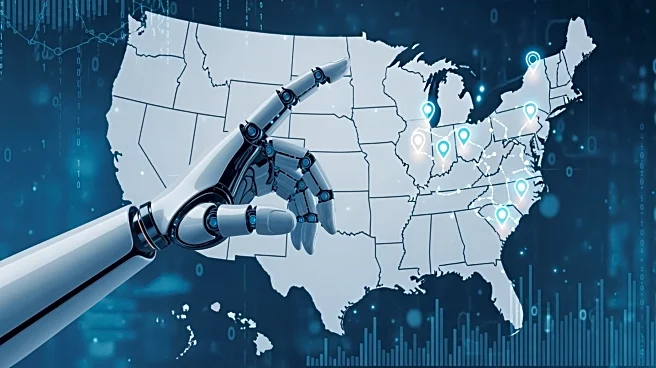What's Happening?
The U.S. labor market is experiencing a notable shift as demand for AI talent continues to rise, even as overall job openings decline. According to Veritone's Q3 2025 Labor Market Analysis, AI-related
roles increased by 14% quarter over quarter, reaching approximately 42,000 positions, marking a 39% increase from the previous year. Major companies like Amazon, Apple, and TikTok are leading in AI job postings, but financial services and retail sectors, represented by JPMorgan Chase and Walmart, are also showing significant AI hiring activity. The report highlights a substantial increase in AI/ML architect positions, which nearly doubled year on year, while AI/ML researcher roles saw a decline. Notably, non-traditional states such as Oklahoma, Michigan, Washington D.C., Missouri, and Utah are experiencing strong growth in AI job openings.
Why It's Important?
The expansion of AI hiring beyond traditional tech hubs signifies a broader adoption of AI technologies across various industries. This trend is crucial for economic growth and innovation, as it indicates that sectors like financial services and retail are increasingly integrating AI to enhance operations and customer experiences. The rise in AI/ML architect roles suggests a focus on implementing and scaling AI solutions, which could lead to increased efficiency and competitiveness for businesses. Additionally, the growth in non-traditional states highlights a decentralization of tech talent, potentially leading to more balanced economic development across the U.S. This shift could also address regional disparities in job opportunities and economic prosperity.
What's Next?
As AI continues to permeate various sectors, companies may need to invest in upskilling their workforce to meet the growing demand for AI expertise. This could involve partnerships with educational institutions to develop talent pipelines and training programs. Policymakers might also focus on creating supportive environments for AI innovation and workforce development in emerging tech regions. The ongoing evolution of AI roles and the need for specialized skills could lead to further changes in job market dynamics, influencing hiring practices and salary structures across industries.











